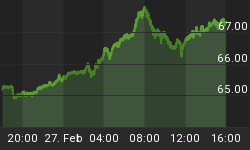Recently, stock markets appear to have experienced an almost euphoric phase, seemingly shrugging off most negative news flow day after day. Whether or not you believe in the so-called "green shoots" of economic recovery, a significant economic rebound, or a continued decline in economic activity, one thing seems abundantly clear: investors have been becoming less risk averse. The most commonly followed "fear indicator", the VIX index, has retracted (likewise, other commonly followed indicators such as the TED spread has tightened and OIS spreads have reverted to levels not seen since the Lehman Brothers collapse), three month T-bill yields have recently risen and equity markets around the world have rebounded from March lows.
Let's not get ahead of ourselves just yet though. We consider the impetus for the recent stock market rally has been news flow and data pointing to economic stabilization in the U.S., not an economic rebound. Negative news flow and data still seems to predominate, though it appears to be dissipating. As such, we may well be nearing an economic trough, as the rate of decline of economic growth (also referred to as the second derivative of economic growth), appears to be slowing. That said, positive news flow continues to be conspicuous in its absence. Hence, we would caution against misinterpreting current data as a precursor to a looming economic recovery. Indeed, significant economic overhang and headwinds remain, while an economic stabilization, in and of itself, does not portend an imminent economic reboun.
Don't miss an Insight:
Sign up for our Newsletter
The Archive:
Read past Merk Insights
In our opinion, it is unlikely that economic growth will exhibit a "hockey stick" rebound because so many issues must still be worked through, many of which may curtail economic growth for an extended period of time. For instance, numerous mortgage holders who bought homes around the peak of the housing bubble are yet to refinance their loans, the unemployment rate continues to climb, and de-leveraging is likely to continue at both the corporate and personal levels. All of which will constrain consumer spending, the main driving force behind economic growth. Moreover, the ambiguousness of the present administration's intentions and policies creates a heightened level of investment uncertainty, while the inflationary implications of present Federal Reserve interventions is increasingly worrying (please see our previous newsletter entitled (Un)Intended Consequences: Uncertainty, Inflation & Inflexibility).
Nonetheless, we may be entering a phase of lower market volatility and a reversal of risk aversion trades. With the onset of the financial crisis, many investors pulled their money out of investment positions in international markets and into the U.S. dollar in a perceived "flight to safety". We consider this phenomenon transient in nature - most of these funds did not flow to "sticky" long-term asset classes (in light of the capitulation in U.S. stock markets, it certainly doesn't appear much ended up in equities). Just witness the yield squeeze exhibited by short-term U.S. T-bills during the crisis. Thus much of this money may be set for imminent redeployment. We believe a reversal of these positions bodes well for many international currencies.
In our opinion, investor risk appetite will remain at an elevated level relative to those seen at the height of the crisis, in part due to a misinterpretation of current data as "green shoots" of economic recovery (a more apt analogy might be of spring sun counteracting the growing size of an out of control snowball racing towards a village), but also due to the generally held view that the worst is behind us. Indeed, the market recently shrugged off the very real prospect of a global pandemic in the swine flu. While we continue to see challenges ahead, we nevertheless consider present dynamics augur well for many currencies outside of the U.S. dollar. In light of present expectations, we consider investors are increasingly likely to redeploy funds internationally, reversing their "flight to safety" trades. We believe certain countries may be better placed than others, particularly China, which can actually afford its stimulus, and whose growth outlook, in our opinion, appears more favorable. Much of Asia may benefit too, while those countries that benefit from a rise in commodity prices, such as Australia, Norway, New Zealand, and to a lesser extent Canada (we consider its close proximity and inter-dependence with the U.S. economy as a drawback) are also likely to benefit from increased investment flows.
Additionally, we consider gold will be a net beneficiary of current policies and market interventions. As previously noted, we believe present initiatives are creating significant latent inflationary pressures. This inflationary overhang appears to have already spooked the market: the spread between long-term TIPS and equivalent maturity Treasury bonds has widened, and the price of gold has appreciated. We consider that the evolution and transpiration of economic ramifications, brought about by present initiatives, will act as a catalyst in underpinning the strength in the price of gold going forward.
The flip side of all this begs the question - if investors increasingly move towards riskier assets, and away from government issues, who will be left (or, more to the point, willing) to purchase the government bonds required to fund the administration's unprecedented level of spending? Especially given the low yields on these securities, a factor compounded by the Fed's intervention in the market. Indeed, the Fed may have to ramp up purchases of these securities if others abstain, monetizing government debt, and driving the price of these assets further from "fair" market value, compounding inflationary pressures in the process.
In light of these dynamics, investors may want to consider whether a basket of hard or Asian currencies would be a beneficial addition to their portfolios.
We manage the Merk Hard and Asian Currency Funds, no-load mutual funds seeking to protect against a decline in the dollar by investing in baskets of hard and Asian currencies, respectively. To learn more about the Funds, or to subscribe to our free newsletter, please visit www.merkfund.com.















